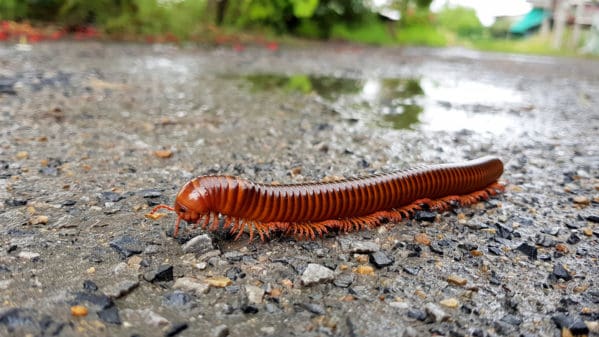

When you see something strange, say something now!
Acting Chief Agricultural Officer Michael James said this slogan is more important than ever in light of the invasive red millipedes encroaching homes, though the bright red arthropods are not new to the island.
“They’re all over the Caribbean. When people started seeing them, [they said] ‘This is something new’ but we’ve had them in Barbados from 2019 or somewhere around that time. They move as soil moves so a person moving soil from place to place probably helped in the distribution,” he said.
Both James and senior agricultural officer (plant protection) Bret Taylor held a media briefing yesterday at the Ministry of Agriculture, Graeme Hall, Christ Church, to further inform the public about the red “creepy crawlies”.
While James said the millipedes – officially called the red-banded, rusty or common Asian millipede – were already established here, it was important for Barbados to guard against other possible invasive species.
“That’s one of the reasons why we at the Ministry of Agriculture, through our Plant Protection Department, are quite insistent on making sure that persons, when they’re bringing things into Barbados, that they go through the right protocols.
“Some people see it as tedious or say, ‘We don’t want them to import things’, but we need to let persons know that, as a result of bringing things, especially on the sly, you can cause damage by introducing invasive species which might become a pest of our agricultural products.
Helped last year
“These are things that all Barbadians should be cognisant of, especially when you’re travelling and you see things that you want to bring in. That actually helped us late last year when we started talking about, ‘If you see something strange, say something now’. This is something we’re going to be doing throughout the year,” he said, adding soil importation was banned.
As for the control of the millipedes, James said there were several steps people could take, which had been published in the media and could be found on the Barbados Government Information Service and Ministry of Agriculture websites. However, he noted the millipedes were not, in fact, an agricultural pest.
Organic material
“All millipedes break down organic material and are important to the ecosystem. They exist for a reason but they can cause damage to the roots of some plants if their numbers are high
enough. What we’re seeing now is an explosion of the population, because we’re coming out of a fairly wet rainy season and the rains are still falling.
“They’re also migrating from fields or unkempt areas where you have a lot of leaf litter; that is what’s causing them to go into houses,” he said.
Taylor cautioned those using pesticides to combat the millipedes to always wear personal protective equipment and to keep pets away from the treated areas until the residue had dried.
Another aspect the agricultural experts touched on was the proper identification of species. James said people were using “Professor Google” to misidentify the millipedes and mistakes of that nature could have possible negative impacts on trade and treatment.
“They are Trigoniulus Corallinus and not Oxidus Gracilis (the greenhouse millipede) as we’ve seen them called, which is a completely different variety. This is important because usually when you have a new invasive species, you have to report it to international bodies, whether it be the National Plant Protection Commission or whatever, so it’s essential that you report the correct name.
“If you say you have a particular pest without confirming it and you put it out there in the ether, what happens is that other countries that trade with you, they’ll say, ‘Well, we hear that you’ve got this particular pest, you have to tell us how you’re going to control it’ and it might not be that pest,” James said.
Taylor added: “It is also important to identify species correctly as it links to how we control, how we manage the particular organism. If you don’t know exactly what your organism is, you may be using the incorrect treatment to manage and control that organism.”
The senior agriculture officer suggested people bury the dead millipedes or add the bodies to their compost heaps instead of simply throwing them in the garbage. (CA)





